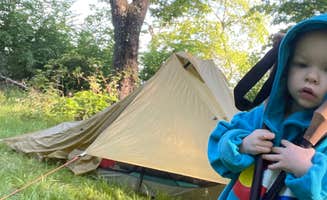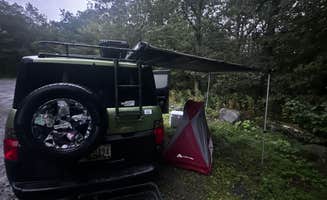Dispersed camping options near Chatham, New Jersey require careful planning due to limited availability in the immediate area. Primitive sites in this region typically lack facilities and are concentrated in state forests and along hiking trails. The terrain in nearby camping areas ranges from flat clearings to sloped woodland sites, with elevations between 400-1,200 feet depending on location. Winter temperatures can drop below freezing, while summer conditions remain relatively mild compared to other northeastern camping destinations.
What to do
Hiking connections: Thunder Swamp Trailhead provides access to extensive trail networks. One camper notes, "Went down Saw Creek trail to a marsh," highlighting opportunities for day hikes from your base camp. Thunder Swamp Trailhead serves as both overnight parking and a gateway to multiple trails.
Hammock camping setup: The terrain and tree spacing at several sites make them suitable for hammocks rather than tents. At Appalachian Trail Designated Backpacker Campsite 2, a visitor observes, "We camped nearer to others but there are secluded spots too. We'll maintained w bear boxes provided. Good trees for hammocking."
Water resupply planning: Pack extra water when staying at primitive sites in the region. Water sources are scarce at Appalachian Trail campsites, with one camper mentioning, "No Water (nearest is sunfish pound- easy hike about a 1 round trip)." Plan for approximately 2 liters per person per day minimum.
What campers like
Natural seclusion: Despite minimal facilities, campers appreciate the relative isolation. At Appalachian Trail- Designated Backpacker Campsite 2, visitors enjoy the "Perfect balance of community and space" according to one reviewer who valued both social and private camping options.
Overnight parking convenience: For those seeking rustic camping near Chatham without backpacking, some trailhead parking areas permit overnight stays. One camper describes Thunder Swamp Trailhead as "a gravel parking lot. Plenty of shade. No one bothered me," suggesting it serves as a low-key option for vehicle-based campers.
Bear safety infrastructure: Safety features at designated sites provide peace of mind. Bear boxes at Appalachian Trail sites are specifically mentioned by campers as valuable amenities, with one noting they are "well maintained" and readily available for food storage.
What you should know
Permit requirements: Several primitive camping areas near Chatham require permits or have specific regulations. Verify requirements before arrival at each location, as enforcement varies by site and season.
Campfire restrictions: Fire bans are common at dispersed sites in the region. Campers should bring alternative cooking methods such as camp stoves since open fires are prohibited at most locations.
Slope considerations: Tent campers should note that some sites have challenging terrain. One camper at Floyd Bennett Field mentioned sites being "a little on the small and sloped side for tent camping," suggesting careful site selection is necessary for comfortable tent placement.
Tips for camping with families
Wildlife education opportunities: Bear safety practices provide learning experiences for children. Using bear boxes at designated sites teaches responsible outdoor ethics while maintaining safety.
Water planning: Families require additional water planning when camping at primitive sites. Calculate 2-3 liters per person daily plus cooking needs, and plan for the additional round trip to water sources like Sunfish Pond from campsites.
Site selection for comfort: When camping with children at primitive sites, arrive early to secure flatter areas. Since many sites are described as having sloped terrain, early arrival improves chances of finding suitable family camping spots.
Tips from RVers
Parking limitations: Most dispersed camping areas near Chatham are not suitable for recreational vehicles. Trailhead parking may accommodate smaller campervans but lacks hookups and typically has size restrictions.
Alternative options: RVers seeking rustic camping near Chatham, New Jersey should consider established campgrounds with primitive sites rather than true dispersed camping. The limited dispersed options in the region generally cannot accommodate larger vehicles or provide necessary turnaround space.



